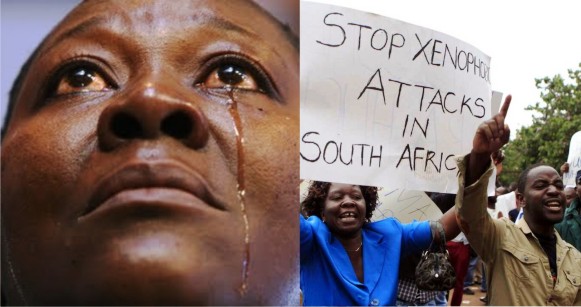Opinion
The Nigerians’ Agony

The xenophobic attacks in South Africa have become so frequent that they follow a known and triangular pattern: riots by the South Africans targeting shops and foreigners; violent clashes (in response to attacks); then arrests and dispersal of rioters by law enforcement agents. The fourth perhaps is: hypocritical speeches and admonitions by the South African authorities to the victims.
In 2008, similar attacks occurred which claimed about 60 lives. It happened again in April 2015 when at least six persons died. Now, for the past two weeks, we have been witnessing a recurrence of the xenophobic attacks. South Africans are at it again. They have never hidden their deep hatred towards foreigners for ‘hijacking’ or outrightly ‘stealing’ jobs and businesses meant for them.
Like others, the attacks this time are still directed at all foreigners. However, it seems that Nigerians are the real targets. For instance, on February 24th, protesters, brandishing all manner of dangerous weapons, stormed the South Africa’s Foreign Ministry with a petition in hand. Among other things, the document specifically asked for the following: “They are arrogant and they don’t know how to talk to people, especially Nigerians”.
The statement is clear and doesn’t need interpretation. It corroborates the widespread claims that Nigerians and their businesses have been particularly targeted in the attacks. This, without doubt, has ignited apparent backlash back home.
In Abuja, the Nigeria Labour Congress, NLC, condemned the xenophobic attacks on Nigerians. A statement signed by Ayuba Wabba, the NLC President, said the February attacks, like those of 2008 and 2015, were unacceptable. He urged the South African Government to move without further delay to prevent a recurrence.
Similarly, the Senior Special Assistant to President Muhammadu Buhari on Foreign Affairs and Diaspora, Abike Dabiri-Erewa, described the attacks as an “unnecessary setback”. She condemned the random deportations of Nigerians and claimed that “they have been arbitrarily raided”.
Still in Abuja, tension rose to fever pitch when members of the National Association of Nigerian Students, NANS, burnt a South African flag and threatened reprisals against South African corporations in Nigeria. Indeed the students broke into the headquarters of the South African company, MTN, which is Nigeria’s biggest telecommunication firm.
Relations with South Africa dominated proceedings in the Senate as lawmakers decided that they wouldn’t move for the severance of diplomatic relations, but send a delegation to South Africa to demand concrete actions and an explanation.
“This attack has become one too many,”said Senate President Bukola Saraki. “We must put a stop to these attacks. We must take the bull by the horn. That is why we have resolved to meet with the South African parliament.”
While we lament or deplore the cruel treatment by our South African friends, we must ask ourselves some obvious questions, do some deep introspection and understand the reasons for their barbaric act. Unfortunately, the South African government and its citizens believe that foreigners are responsible for their ailing economy.
It is time the federal government realized that Nigerian emigration situation has reached a crescendo and must be addressed with all seriousness. In a 2016 report, the Italian Interior Ministry claimed over 36,000 illegal Nigerian emigrants made the voyage of death across the Mediterranean Sea to Italy in that year alone. Those who journey on this route understand the degree of risk in reaching their destinations. Some get drowned in the sea, while others are either summarily executed or detained in anti-immigrant camps.
Just recently, a gory picture emerged on the internet of some African men, including Nigerians, with hands raised behind their heads while being hurled to their death in the hands of gun-wielding Libyan militiamen. The only official response to the mass execution was a travel warning from Dabiri-Erewa. After that everyone returned to passiveness or deliberate amnesia.
We cannot hide the fact that Nigeria is perceived in the eyes of the international community as exporter of crimes, such as drug business, financial crimes and human trafficking etc. We cannot deny the fact that Nigerians constitute the highest number of prostitutes in Europe and elsewhere, while we remain the all-time signature reference on Advanced Fee Fraud, locally called ‘419’.
Apparently, the root causes of emigration of Nigerians are corruption, bad governance, poverty, injustice, unemployment, insecurity and economic hardship, among others. If the incidents of bestiality against Nigerians fail to provoke government to formulate policies that will properly address the factors underlying the exodus of Nigerians, the latest xenophobic attacks should.
Despite the risk involved, it is unlikely that Nigerians facing those conditions will not jump at an offer to travel to countries where they are unwanted. Until the Nigerian government puts on its thinking cap and fashions out policies that will address the socio/economic factors underlying illegal emigration, Nigerians should expect more attacks and inhuman treatment in foreign lands.
Arnold Alalibo
Opinion
NDDC: Time To Illuminate Homes

Opinion
When Democracy Becomes Too Expensive

Opinion
Righteous Leadership Still Thrives

-
Politics4 days ago
2027: NIGERIANS FAULT INEC ON DIGITAL MEMBERSHIP REGISTER DIRECTIVE
-

 Environment4 days ago
Environment4 days agoLAWMA Director Says Sweeping Reforms Have Improved Waste Collection
-
Politics4 days ago
LP Crisis: Ex-NWC Member Dumps Dumps Abure Faction
-

 Politics4 days ago
Politics4 days agoUmahi Dismisses Allegations On Social Media, Insists On Projects Delivery
-

 Sports4 days ago
Sports4 days agoAbia Not Sure To Secure continental Ticket
-
Politics4 days ago
NATASHA ELECTRIC VEHICLES INITIATIVE IN KOGI CENTRAL
-
Sports4 days ago
La Liga: Yamal Records First Career Hat-trick
-

 Sports4 days ago
Sports4 days agoPSG Extend Lead In Ligue 1

